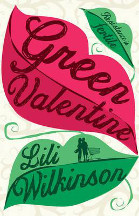Green Valentine by Lili Wilkinson

Allen & Unwin, 2015. ISBN 9781760110277
(Age: 13+) Highly recommended. Gardening. Environmental protection.
Conservation. Humour. Astrid is smart and pretty and a favourite
with all the teachers. Hiro is rude and resentful and always in
trouble. They meet at the shopping mall when Astrid is dressed in a
lobster costume and Hiro is working gathering shopping trolleys.
They give each other superhero nicknames - Lobster Girl and Shopping
Trolley Boy. When Hiro is assigned to Astrid to help her in the
school garden that she is trying to get going, he doesn't recognise
her and begins to get to know Astrid only as Lobster Girl. But the
path of love is not easy.
This is a very funny, but also thought provoking book that tackles
some big themes in an easy to read way that make it quite difficult
to put down. Astrid is the perfect girl but can be quite annoying
about her belief that she knows best for everyone. Hiro is smart but
lives to make trouble at school. When the two get together, Astrid
learns not only about gardening and how to make things grow, but
about tolerance and respect for the opinions of others, realising
that not everyone has the same aspirations to be good and go to uni
that she has. The secondary characters in the book are also very
well rounded. I found the blossoming of Astrid's mother after
finding out that her husband was having an affair and kicking him
out a great take on a marriage break-up. Hiro's grandmother too is a
wonderful character and her garden is one I would like to visit.
The beliefs of the mayor and Astrid's science teacher about what
they want their community and school to be like clash with Astrid
and Hiro's attempts to beautify their part of the city and Astrid's
crusade for the environment. Wilkinson is able to introduce (by way
of very funny footnotes) lots of information about protecting the
environment and the difficulties that campaigners face when they are
trying to sway public opinion, not to mention lots of hints about
growing vegetables and community gardens.
This is a feel-good book, with a romance that feels real and plenty
of humour to keep the reader laughing until the end. It would also
be a great novel for a literature circle or a class text as the
themes of protecting the environment, disengagement from school, the
responsibilities of local government and tolerance for others'
beliefs give ample opportunity for discussion and thought.
Pat Pledger